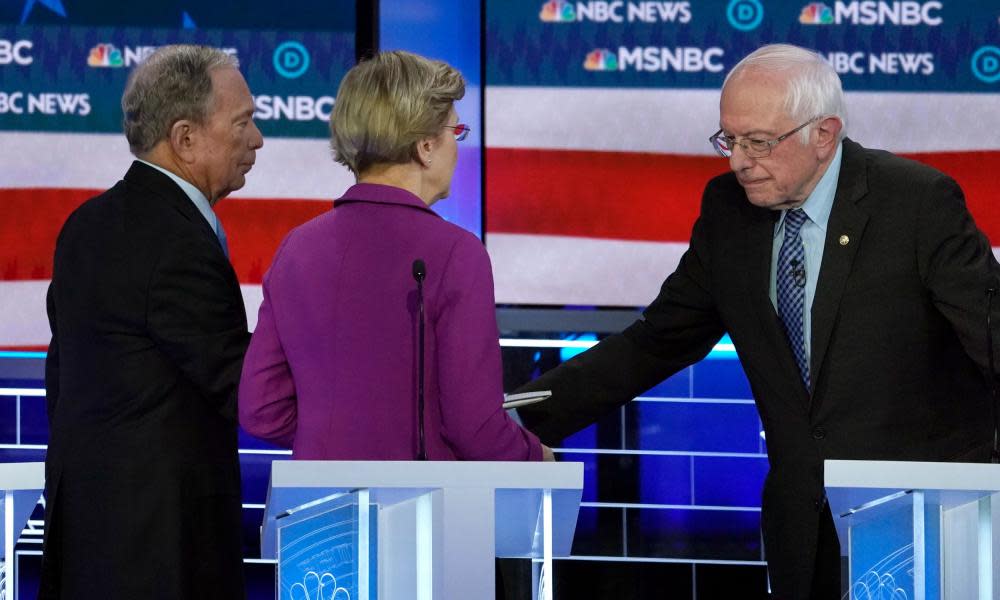Debate shows Bernie Sanders could win most votes but be denied nomination

Amid the Mike Bloomberg pile-on and the Pete Buttigieg-Amy Klobuchar squabbling, there was a key point that slipped by almost unnoticed during Wednesday’s tumultuous Democratic debate – one that could potentially prevent Bernie Sanders from becoming the nominee.
Towards the end, each of the six candidates was asked if – at the Democratic national convention this summer in Milwaukee – they would support the person who has won the most delegates – even if that person hasn’t achieved a majority.
Five of the candidates said they would not. The Democratic socialist and Vermont senator said he would.
Related: Democratic debate: key takeaways from the bust-up in Las Vegas
It might seem a wonky, opaque detail, but it raises the prospect that Sanders, who has a commanding lead in the polls and has emerged as the frontrunner, could win the most pledged delegates – those allocated on the basis of votes during the marathon Democratic primaries – but be swindled, at the last, by the Democratic party elite.
That’s because of superdelegates.
Superdelegates, who are chosen by the central Democratic party, are different from pledged delegates, who are effectively voted for during the primaries. As of 20 February, Buttigieg is in the lead in terms of pledged delegates, with 22 to Sanders’ 21.
But Sanders is better-placed than Buttigieg to pick up more pledged delegates in Nevada on Saturday and South Carolina the following week. He is also likely to add to his total again on Super Tuesday, when 14 states vote, yielding a total of 1,357 delegates.
If Sanders’ popularity endures, he could amass more delegates than his rivals by the time of the July convention, when the pledged delegates effectively vote for the nominee in a first round of voting that is meant to pick the nominee.
However, if Sanders does not have an absolute majority – more than 50% – during the first ballot when the pledged delegates line up behind their chosen nominee, then it is the superdelegates who will join the vote in a second round of voting.
Superdelegates, who in the past have aligned with the center, “establishment” wing of the Democratic party, will be free to wade in and vote for whomever they choose in this second ballot.
With Sanders a resolute outsider in Democratic terms – he sits as an independent in the Senate, and had to sign a pledge last year committing to the party – he is unlikely to be a favorite of these party grandees.
Related: Who won the Nevada Democratic debate? Our panelists' verdict
If the superdelegates vote for a more centrist figure, that could mean Sanders – even if he has secured a majority of votes in the primaries – would be pipped at the post, and not be the nominee.
That’s why that moment in the Nevada debate was so important. Five of the candidates were effectively saying that even if they were losing at the Democratic national convention, they were open to the unelected superdelegates weighing in in their favor, potentially gifting them the nomination even though they did not win the support of the most actual voters in the whole race.
It’s a prospect that would leave Sanders’ supporters irate – and even upset some non-supporters. Marianne Williamson, Sanders’ erstwhile rival for the nomination, was among those to criticize the process on Wednesday night.
“The Democratic Party should be on notice: if you even think about using superdelegates to take the nomination from someone who has the plurality of delegates going into Milwaukee, we the people will not take it lying down,” Williamson wrote on Twitter.
The superdelegate rules were changed in 2018 after criticism from Sanders and others. Until then, superdelegates could vote for whomever they chose in the first round of the convention, and an overwhelming majority supported Hillary Clinton in 2016, although she was also ahead of Sanders in pledged delegates and rank-and-file votes.
At the time, Sanders called the 2018 change “an important step forward in making the Democratic party more open, democratic and responsive to the input of ordinary Americans”.
With the prospect of superdelegate interference once again looming over his presidential chances, however, it is likely Sanders feels more reforms are needed.

